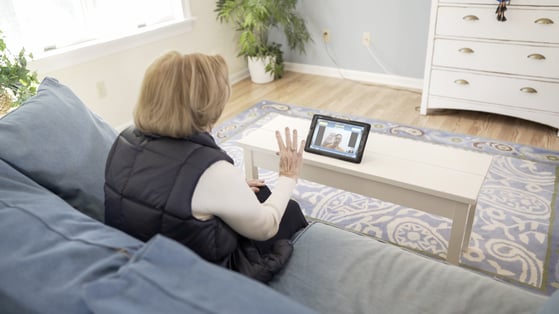In the reimbursement partner Q&A series, we share knowledge and expertise from HRS partners across the country who have pursued reimbursement through CMS, commercial payer partnerships, or private pay programs. Below, Liberty HomeCare Vice President of HomeCare & Post-Acute Care Services, Donna Turlington, shares her insights into Liberty's reimbursement progress with CMS and commercial payers.
- When your organization began the process of telehealth reimbursement, how did you decide whether to pursue reimbursement through CMS, commercial partnerships, or other avenues?
We launched a telehealth program years before CMS and commercial payers supported reimbursement options. We began to look at reimbursement options during the pandemic as a significant portion of our patients became more difficult to reach in their homes due to PPE shortages and fears of exposure among our patients and their families.
To help compensate for the loss of in-person visits, we rapidly expanded our use of virtual visits. The use of virtual visits not only maintained our communication with patients, as well as our readmission rates, but it provided us with the opportunity to create an additional revenue stream through partnerships with commercial payers.
2. What obstacles did you face when pursuing reimbursement and how did you overcome them?To begin, we were unsure of the billing codes related to each commercial payer we worked with. Our Director of Billing reviewed the information being sent by payers, but also took the extra step to call each insurance company to verify uncertainties.
To accurately track and bill for virtual visits, we had to work quickly with our telehealth provider, Health Recovery Solutions, and the HRS Reimbursement team, to create visit types within our system. These types included “paid virtual visit” and regular virtual visit, and our clinicians underwent training to distinguish between the two types and qualifications for a “paid virtual visit”. Finally, we had to develop a written process for pulling virtual visit interventions into the patient’s plan of care and develop in-service education.

To receive reimbursement for virtual visits, we were able to avoid bringing on additional staff, by implementing new training for our current staff and designating a virtual visit manager in our home health offices. The virtual visit managers are typically a PRN RN or PRN PT; however, all Liberty HomeCare clinicians are trained on how to perform a virtual visit and how to identify when a virtual visit is necessary.
For our palliative care patients, receiving 24/7 remote patient monitoring, we hired an NP who monitors patients daily and performs monthly phone calls with patients to review their data and then follows up with their physicians. Liberty also has an FT Medical Office Assistant who manages the technical aspects for reimbursement.
4. What advice would you offer to other healthcare providers seeking RPM and telehealth reimbursement?Make sure you have processes in place and everyone is trained. By everyone, I mean not only clinicians but office staff, corporate management, billing and marketing.
5. What are the next steps for Liberty HomeCare in pursuing reimbursement opportunities?Our team is working with HRS to compile telehealth outcomes data for each payer, highlighting outcomes among their respective members. We are currently participating as a preferred provider in a bundled program now which enables us to offer telehealth and RPM services to any patients enrolled in the bundle, providing bi-weekly clinical reports to the patient's physician.
We’re committed to telehealth and RPM as a way to improve quality of care for our patients and to reduce hospital readmissions for our partners. Creating bundle arrangements with different payers will enable us to expand availability of telehealth services, making telehealth and RPM a standard service for Liberty patients. In addition, it will benefit our staff by reducing administrative costs and workload.
